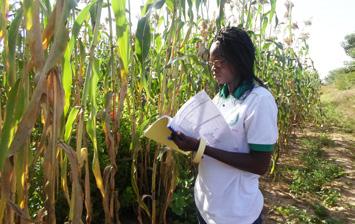
16 minute read
A Selection of Research Results and Achievements of IFS Grantees
by IFS
IFS grantees are contributing significantly to changes around the world, through their commitment to scientific advancements, their enthusiasm to learn and to work with others, and their attainment in getting their research results put into use at local, national and global levels. In 2022, we followed up on the results and achievements of the 196 grantees awarded grants in 2018. (For a detailed list of approved projects, refer to the IFS Annual Report 2018.) As gleaned from grantee responses to the questions on the Project Completion Forms (PCFs), numerous impacts are evident from IFS’s support of early-career scientists, in immediate, near-term and long-lasting ways, in villages, forests, fields, policy discussions, government practices, and the global scientific community.
In terms of how the results of their IFS-funded research have been put into use, 2018 grantees mentioned contact with government officials or local communities who have been informed about the research outcomes, as well as the uptake of practices by people who were involved in the project. Of the 17 UN Sustainable Development Goals that their research projects were meant to address, the top six were:
SDG 1: No poverty
SDG 2: Zero hunger
SDG 3: Good health and well-being
SDG 12: Responsible consumption and production
SDG 13: Climate action, and
SDG 15: Life on land
Common throughout the responses in these particular PCFs, grantees mentioned reduced interactions with communities and potential end-users due to the Covid pandemic, in addition to reporting delays and practical problems in their project implementation due to pandemic restrictions.
All 117 responding grantees mentioned that other people benefitted from their grant, including 376 scientists, 284 technicians and 693 research students from their own institutions, and 50 research students from other institutions. Fourteen of the grants also brought benefits to over 300 people outside of academia including farmers, fishermen and local authorities such as park rangers. Grantees’ institutions themselves benefitted from the IFS research projects, such as through:
> Improvement of their laboratories through the purchase of scientific equipment and consumables, and their use by other scientists and students at the institution as well as for teaching and expanding the scientific networks of the institution
> Provision of hands-on practical training and mentoring of students collaborating in the project
> Increased visibility and even ranking of the institution through their publications as well as through publicising of their international grant on institutional and other websites, ultimately in some cases leading to increased opportunities to attract students to the university
> Increased knowledge of all aspects of grant proposal writing and grant management at institutional level
> Encouragement of other staff members to apply for IFS or other international grants
> Improved research capacity and technical skills of institutional staff
> Increased institutional visibility by national science and agricultural authorities and entities
> Recognition that the institution has specific competencies and expertise
> Contribution to accreditation of university programmes
> Strengthening institutional collaboration
> Reaching institutional goals in promoting rural development
> Increased recognition of institutional administrative reliability through successful grant administration, and
> Collaboration and partnerships with international scientists.
Indeed, respondents report that they established contacts with 360 grantees in their own countries, 65 grantees in other countries, and 31 IFS advisors in their own country and 40 in other countries. Additionally, they established contacts with 430 other scientists in their own countries and 266 scientists in other countries. The grantees are active members of 197 learned societies or scientific networks, with 36 of these affiliations directly arising from contacts made through the IFS grant. The IFS funding was also seen as responsible for a number of grantees being promoted to higher academic ranks and in the case of some, enabling 25 to obtain their PhD degree thanks to IFS support.
As a result of the IFS grant, 69 – more than half of respondents – were able to obtain additional funding for more advanced academic training, travel grants, or further research projects. One grantee from Vietnam was twice a team leader on government-funded projects on feed ingredients and nutrient requirements for broiler chickens in Vietnam. Another was a principal investigator in Bangladesh on four projects on E. coli in chickens and water supply systems, salmonella in cattle, and bacteria in ducks. One grantee was awarded a Future Leaders African Independent Research (FLAIR) Fellowship for 2020–2022. With funding of £288,333, this research aims at improving access to soil information by smallholder farmers for sustainable soil, water and nutrient management, and, consequently, increased crop yields and incomes. Another grantee was awarded the Organization for Women in Science for the Developing World (OWSD) Early Career Fellowship (2019–2021). With a grant amount of USD 50,000, her study is on promoting underutilized oilseeds to address malnutrition in Africa and is based on preliminary data obtained from her IFS project.
Of 117 grantees, only two people left research, one moving to a commercial company, and one to a consultancy company involved in research. The others report that they are all still active in research. One hundred and nine grantees stayed in their own country or in another eligible country while six reported that at the time of submission of their PCF, they were abroad: two for their PhD studies (Germany and South Africa), two on a post-doc (USA and France), and one with a position at a research institute in the UK. Of the people staying in their country, three worked at a research-oriented national NGO, and 17 were employed at national research institutes, while the remaining were affiliated with a university, either full- or part-time.
The following quotes are representative of what 2018 grantees view as the significance of the IFS support for their careers:
”I was in initial stages of my career when I received IFS support. The grant gave me confidence in myself to work for the scientific community and general society. The IFS grant was just like a seedling for me. I travelled across the country and liaised with various livestock stakeholders to accomplish the IFS project activities. Additionally, I developed linkages with academia and presented IFS work in a national symposium at Agha Khan University, Karachi, Pakistan. In the end, I am thankful to IFS for supporting me at such an early stage of my career.”
”I am on the verge of completing my PhD solely due to IFS support. I have networked, gotten mentorship and collaborated both locally and internationally. I feel more confidence in research proposal and scientific paper writing, and never feel disappointed when facing difficulties. IFS support is visible in my career and I am proud of it.”
”The research I undertook through the grant will result in at least two publications which will contribute to my next promotion from senior lecturer to associate professor. It has enabled me to identify a research team to work with after we spent the past three years on the IFS research journey, and we look forward to publishing and researching together in the near future.”
”I must acknowledge that IFS was my first research grant. Getting the IFS grant gave me confidence and motivation that eventually propelled me to win more grants. The IFS grant introduced me to the field of research as a principal investigator where I had to lead the team. This gave me real hands-on experience in managing grants. IFS has had a significant impact on my research career path and I will remain grateful.”
”A major limitation in conducting extensive research in the chemical sciences in Ghana and other developing countries is the ability to purchase laboratory solvents, standard reagents and other chemical supplies. However, with the IFS grant, I was able to buy all the needed laboratory consumables and other reagents for my research work.”
”This project has provided an opportunity for my research students since one of the objectives of this research activity was to train undergraduate students at the Department of Chemical Engineering and Processing, Nong Lam University [Vietnam]. I have successfully supervised four students. The project also provided me an opportunity to guide and share the knowledge and research skills with my research team including my students and staff. As a result, I have collected the research results for two scientific papers on filtration membrane and on lycopene of watermelon.”
”I have been getting invitations for reviews, workshops, conferences, and lectures as well as for editorial membership of academic journals, all related to the field of drug discovery. Currently, I am an editor with the Scientific Reports (Nature), BMC Complementary and Alternative Medicine, and EvidenceBased Complementary & Alternative Medicine.”
”The IFS grant has helped me to develop a strong curriculum and encouraged me to design new projects with innovative ideas. It has not only encouraged me but the other females of my institution to seek such opportunities as well. Therefore, IFS proved highly significant for my career. I am obliged to the founders, the financers and the organizing team of IFS for a transparent selection of grantees all over the globe. I highly appreciate the whole team for continuation of this programme for fifty years. I wish other such programmes to be inaugurated especially for women scientists.”
Difficult though it is to choose which of the 2018 projects to highlight, presented here in the next pages are 13 that are representative of topics, countries, regions, women and men. These selections also represent the many early-career scientists who IFS is honoured to include among those who work to support its mission.
DR NGUYEN THANH BINH Nong Lam University, Ho Chi Minh City, Vietnam
A pre-feasibility study on composting of animal waste using the aerated compost system and Its utilization as a soil fertilizer in Ho Chi Minh City, Vietnam
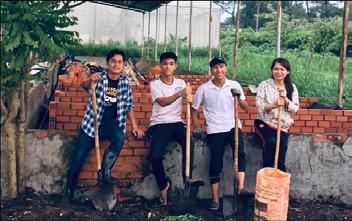
The increasing demand for high-quality compost places urgent demands on improving compost technology and developing appropriate methods for rapidly assessing compost quality. The aerated compost system accelerated the decomposition of organic matter, shortened the composting time, and improved the compost product quality after it was applied to the soil. The results of this project have been put to practical use at both small and medium scales, as well as at a large scale. At small to medium scale, the Micro-bin Composting and Benchmark Composting models served for research, training and recycling of animal waste and crop residue purposes. On a large scale, the basic technical highlights related to raw materials and composting processes have also been shared with the CP Vietnam composting plant, which supplied the animal waste for research purposes. After the project ended, the composting site at the Experimental Farm of the Faculty of Agronomy, Nong Lam University, Ho Chi Minh City, significantly reduced the amount of organic waste sent to landfills, and the hands-on activities engaged students in the action for sustainable waste management. The students in the Compost Team have just won the second prize in the Agricultural Start-up Competition held by our university. I also received the President’s Certificate of Merit in 2019–2020 in connection with my IFSsupported project.
DR MOREBLESSING CHIMWETA Bindura University of Science Education, Zimbabwe
Optimising maize yield under flood-recession cropping in the Zambezi Valley in northern Zimbabwe
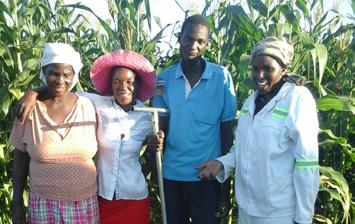
The research yielded results that eased the adoption of concepts to select appropriate maize cultivars, and the best fertility amendment regimes, and clarified for farmers that edaphic conditions for best production are not necessarily closer to river channels, since the study was conducted through participatory action research. The farmers who witnessed the practical aspects of the field research are adopting micro-dosing and careful selection of crops to curb or cope with salinity-related stress. In personal terms, the thorough selection and feedback process for an IFS grant gave me confidence and helped me develop meaningful research. IFS support also helped me connect with farming and scientist communities within and beyond my country.
Mr Guizada Duran
Universidad Mayor de San Andres, Bolivia
Distribution and habitat suitability modelling for the river dolphin (Inia boliviensis) in the Bolivian Amazon
The results obtained on the population size of the river dolphin found within the Ibare-Mamoré Municipal Protected Area were shared with the Municipal Authorities and those responsible for the Protected Area (Autonomous Government of Trinidad) and are being used as a baseline for monitoring the species. At the same time, the Environmental Education Center UNE in the city of Trinidad has a permanent exhibition of the results obtained from the project, thus strengthening environmental education in the city. This was the first research grant I received and as a result I have been able to start relationships with local institutions, which are key to the long-term research on and conservation of the Bolivian river dolphin. With the support of IFS, we also made innovative use of drones in our research in Bolivia.
Mr Chefor Fotang
Center for Indigenous Resources Management and Development (CIRMAD), Cameroon
Ecology and behaviour of wild Nigeria-Cameroon Chimpanzee in Kom-wum forest reserve and Mbi Crater Kefem landscape in the northwest region of Cameroon
My findings and two published papers have been shared with the Government of Cameroon. Kom-Wum Forest Reserve will soon be re-classified as a wildlife sanctuary and an Important Plant Area because I found many chimpanzee signs and suitable habitats outside the reserve boundaries and identified important plant species during my survey. Additionally, local environmental non-profit organisations working on wildlife conservation in Kom-Wum Forest Reserve will soon send a report including my findings to the Royal Botanical Gardens in London, to speed up reclassification.
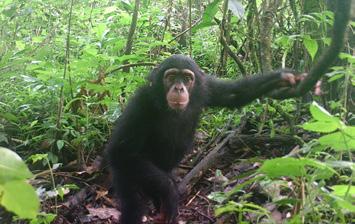
DR SYED MASHKOOR MOHSIN GILANI
University of Agriculture, Faisalabad, Pakistan
Study on clonal groups, virulence genes, and antibiotic resistance of avian pathogenic Escherichia coli (APEC) from poultry birds and their zoonotic potential
Antimicrobial resistance (AMR) poses a severe threat to global public health, causing a profound impact on morbidity and mortality. In Pakistan, antimicrobials have been used by the poultry industry for decades, resulting in multi-drug resistant bacteria in the poultry production chain, with serious public health risks. This project applied phenotypic and genotypic next-generation sequencing tools to assess the emergence of critically essential antimicrobials colistin and tigecycline resistance in E. coli sourced from the broiler production pyramid. Data regarding virulence genotyping and antimicrobial susceptibility of avian pathogenic Escherichia coli (APEC) isolates from Pakistan have been produced from this study. Multiplex polymerase chain reaction (PCR) schemes targeting five or more virulence genes of APEC simultaneously have been optimised and this can be used in future for diagnosing APEC from poultry. Moreover, this study determined the possible drug resistance and susceptibility to drug of choice for colibacillosis. Poultry farmers have been advised to avoid colistin sulphate use as this leads to antimicrobial resistance. This is the first study on detecting virulence-associated genes (VAGs) and multidrug resistance among APEC isolates in Pakistan. In the future, the strains with the predominant set of VAGs can be used for colibacillosis diagnosis and as a potential vaccine candidate. Results from our analysis will contribute to the understanding of the transmission dynamics of horizontal or vertical gene transfer in the broiler production cycle, while providing the single nucleotide polymorphism (SNP) basis for resolution of strain differences required to describe the epidemiology of the spread of AMR from Farm to Fork.
Dr Jean Nepomuscene Hakizimana
Sokoine University of Agriculture, Tanzania
Understanding the epidemiology and socio-economic impact of African Swine Fever in Rwanda
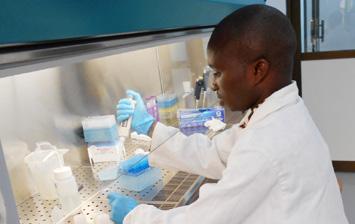
The growing domestic pig sector contributes to poverty reduction among smallholder pig keepers. However, the growing pig industry is threatened by African swine fever (ASF), a contagious disease caused by the ASF virus (ASFV) that causes high mortality, approaching 100%, in domestic pigs. In Rwanda, several ASF outbreaks in pigs have been reported to the World Organization for Animal Health (OIE) and no ASFV from Rwanda has been subjected to complete genome sequencing. This study aims to perform complete genome sequencing and bioinformatics analysis of ASFV causing recent outbreaks in Rwanda to better understand the transmission dynamics, early detection of the virus at the genomic level and possible control strategies. The diagnosis results from our IFS-funded project were communicated to the Rwandan veterinary authorities and appropriate recommendations and control measures were implemented. After getting positive African Swine Fever (ASF) results, a press release was issued to inform the public and domestic pig farmers about ASF preventive and control measures. The actions taken allowed the ASF outbreak in the country to be rapidly curbed. This project not only contributed to improved food security and livelihoods of local communities, especially for women who are the most active domestic pig farmers in Rwanda, but also protected ASFV-free regions from ASFV introductions. Thanks to our IFS grant, the number of partners with our institution has increased. Our project was carried out in three countries in collaboration with veterinary authorities. The scientific expertise and diagnostic capacity of the laboratory at our institution have been put in the service of concerned countries. This collaboration continues even after our IFS-funded project and on pathogens other than African swine fever.
Dr Unique Ndubuisi Keke
Federal University of Technology, Minna, Nigeria
Exploring the spatial patterns of benthic macroinvertebrates biodiversity in Nigerian streams
The Niger State Ministry of Water Resources has adopted the surrogate indicator species as a compulsory and effective tool for monitoring water quality. They have reduced reliance on environmental variables and instead made mandatory use of the surrogate species identified in this study as ideal bioindicators of environmental quality. IFS support opened a number of promising research windows by connecting me with more experienced international and national researchers, and also broadened my research, statistical and analytical skills.
Université de Fada N’Gourma, Burkina Faso
Contribution to the development of agro-resources: Production of bioenergy from the anaerobic digestion of cashew nut (Anacradium occidentale) processing waste in Burkina Faso
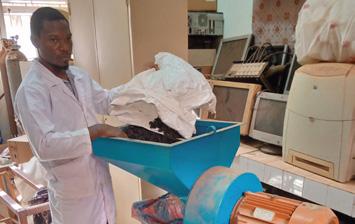
Jomo Kenyatta University of Agriculture and Technology, Kenya
Microbial diversity of salt lakes in Kenya
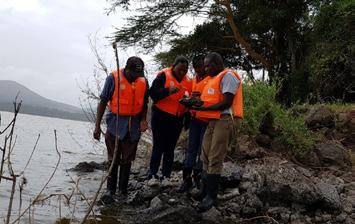
Other researchers are now consulting me concerning using the DADA2 pipeline amplicon sequencing I used during bioinformatics analysis. This is a result of my poster presentation at the 5th African International Biotechnology and Biomedical Conference (see Twitter AIBBC@AIBBC1). Local lakeside communities now know about the conservation, in line with the African Biogenome Project (https:// africanbiogenome.org/), which aims to conserve and improve African biological diversity. I held public meetings (‘Barazas’) with the help of the Kenya Wildlife Service when developing conservation awareness. My findings will be helpful to the government in policy-making, especially in the Kenya Wildlife Service, and I will submit my final report to them after graduation. I am also in contact with Real Integrated Pest Management, which produces biological pest controls, bio-enhancers and biofertilizers. After sharing my findings with them, they are keen to assist me with the coming study. The plant-promoting bacteria recovered from the previous study have good potential for sustainable agriculture and environment as biopesticides, biofertilizers and bioenhancers.
Cashew nut processing units in Burkina Faso generate thousands of tonnes of shells which constitute a source of environmental pollution. Biogas from anaerobic digestion showed the possibility of bioenergy recovery from cashew shells that can cover the energy needs of processing units. This study aimed to develop a bioenergy production technology from the mechanisation of cashew nut hulls. The study was designed to understand the safety of digestate better to avoid harmful effects on soils, crops and the environment. The results show that these small producers can use the cashew nut hulls to produce energy from their methanization. This technology would lead to a significant digestate production that could constitute a fertilizer. In addition to the two publications from this project, the results have been shared with small-scale processing units and producers in Burkina Faso. A protocol for dealing with drainage and fermentation issues was also developed and disseminated.
Dr Anh Thi Lan Nguyen
University of Science, Vietnam National University, Hanoi, Vietnam
Gastrointestinal parasite infections and self-medication of the Tonkin snub-nosed monkey (Rhinopithecus avunculus) in Ha Giang Province, Vietnam
My first IFS grant and publication provides the appropriate standards and training systems under the strategic mission of the Vietnam National University at Hanoi, and serves as an essential reference for students majoring in zoology and ecology, and those interested in the study of primate nutritional ecology, as well as a research document to contribute to the development of primatology in our country. My second IFS grant expanded the research direction on gastrointestinal parasites in the Tonkin snub-nosed monkey and on plant secondary compounds with anti-parasitic and antibacterial properties. Plant species such as Garcinia fagraeoides, Garcinia vilersiana, Ficus subtecta, Schefflera enulose, Centis philippense and Polyalthia floribunda can be included as medicinal plants in developing forest corridors for habitat for the Tonkin snub-nosed monkey. Ha Giang Forest Protection Department is planning to use these plants to expand the habitat for this species next year in the Khau Ca area. Parasite data will help provide managers with appropriate and timely species conservation solutions. In addition, I will be training students in the Faculty of Biology to continue the conservation of primates in particular, and more broadly of wildlife in Vietnam.
Dr
THI
Thu Tram Nguyen
Can Tho University of Medicine and Pharmacy, Vietnam
Natural products from Vietnamese lichens as potential anticancer agents
This study identified four common Vietnamese lichen species: Parmotrema poolii, P. tinctorum, Usnea baileyi and U. undulata, by macroscopic and microscopic determination of morphometric characteristics and by DNA analysis. The cytotoxic effect of three extracts (n-hexane, acetone and methanol) of each lichen species was evaluated against two human cancer cell lines (MCF-7 and NCI-H460) by sulforhodamine B assay. The key determination by macroscopic and microscopic characteristics has been used to identify the four lichen species. Additionally, several isolated compounds and lichen extracts with high cytotoxic activity have been used for further preclinical and clinical research towards application in supplemental/functional products for cancer treatment.
Burkina Faso. Through this project, the phytogenetic resources of this sorghum phenotype are also better known. Correlations between grain and fodder production characters in sweet sorghum of Burkina Faso have been established. Thus, the identification of the genotypes MBO7, MTC2, PGO3, SPI2, You5 and Yoh3 with high grain and fodder production will serve as parents for the production of dual-purpose sorghum in Burkina Faso. In addition, demonstrating an optimal dose of 100 kg/ha of NPK mineral fertilizer for the dual use of this cereal is an important advance in improving productivity and the development of this cereal. Also, due to nutritional value and fodder digestibility, this cereal is increasingly cultivated by producers as fodder. This project gave me a collaborative framework for exchanges with other scientists and other grantees through conferences and other research groups.
DR FÉLICIEN TOSSO
Laboratory of Applied Ecology, Benin
Exploring soil seed bank in two contrasted forest reserves in Benin (West Africa) for ecological restoration
With the IFS support, I have collected extensive and critical data on soil seed banks in two forest reserves in contrasting environments in Benin. These data have been directly useful for sustainable forest management, as the results of my project enabled the Lama Forest’s manager to establish a list of tree species absent in the soil seed bank. An operational planting plan of these species was developed. The results of my project found that the Wari-Maro dry forest in West-Central Benin is degraded with a lack of tree species in the soil seed bank. These results have led to the development of a large plantation project to restore this forest, which is planned to start soon. The next step in this project will be to evaluate the soil seed bank for the forests near Wari-Maro. The research done with the IFS grant has increased my visibility and enriched my network, thanks to the master’s thesis supervision and publication, and my presentation at conferences.
Dr Josiane Tiendrebeogo
Université Kizerbo, Burkina Faso
Selection of best varieties of sweet grain sorghum [Sorghum bicolor (L.) Moench] from Burkina Faso for dual use: Food and fodder
This project supported by IFS has made it possible to select sweet grain sorghum genotypes with dual-use potential for the agricultural world. Their development would considerably contribute to a country with agro-pastoral vocations like
